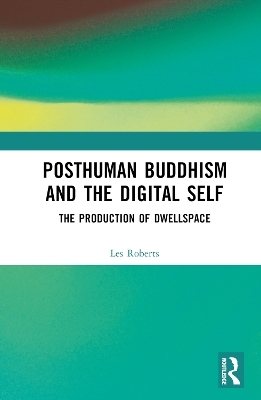
Posthuman Buddhism and the Digital Self
The Production of Dwellspace
Seiten
2023
Routledge (Verlag)
978-0-367-14778-5 (ISBN)
Routledge (Verlag)
978-0-367-14778-5 (ISBN)
Posthuman Buddhism and the Digital Self lays the groundwork for the concept of ‘dwellspace’ as a means by which to unpick the shifting spatial, temporal and experiential modalities of everyday mediascapes.
In Posthuman Buddhism and the Digital Self, Les Roberts extends his earlier work on spatial anthropology to consider questions of time, spaciousness and the phenomenology of self. Across the book’s four main chapters – which range from David Bowie’s long-standing interest in Buddhism, to street photography of 1980s Liverpool, to the ambient soundscapes of Derek Jarman’s Blue, or to the slow, contemplative cinema of Tsai Ming-Liang – Roberts lays the groundwork for the concept of ‘dwellspace’ as a means by which to unpick the shifting spatial, temporal and experiential modalities of everyday mediascapes. Understood as a particular disposition towards time, Roberts’s foray into dwellspace proceeds from a Pascalian reflection on the self/non-self in which being content in an empty room vies with the demands of having content in an empty room. Taking the idea of posthuman Buddhism as a heuristic lens, Roberts sets in motion a number of interrelated lines of enquiry that prompt renewed focus on questions of boredom, distraction and reverie and cast into sharper relief the psychosocial and creative affordances of ambience, spaciousness and slowness. The book argues that the colonisation of ‘empty time’ by 24/7 digital capitalism has gone hand-in-hand with the growth of the corporate mindfulness industry, and with it, the co-option, commodification and digitisation of dwellspace. Posthuman Buddhism is thus in part an exploration of the dialectics of dwellspace that orbits around a creative self-praxis rooted in the negation and dissolution of the self, one of the foundational cornerstones of Buddhist theory and practice.
In Posthuman Buddhism and the Digital Self, Les Roberts extends his earlier work on spatial anthropology to consider questions of time, spaciousness and the phenomenology of self. Across the book’s four main chapters – which range from David Bowie’s long-standing interest in Buddhism, to street photography of 1980s Liverpool, to the ambient soundscapes of Derek Jarman’s Blue, or to the slow, contemplative cinema of Tsai Ming-Liang – Roberts lays the groundwork for the concept of ‘dwellspace’ as a means by which to unpick the shifting spatial, temporal and experiential modalities of everyday mediascapes. Understood as a particular disposition towards time, Roberts’s foray into dwellspace proceeds from a Pascalian reflection on the self/non-self in which being content in an empty room vies with the demands of having content in an empty room. Taking the idea of posthuman Buddhism as a heuristic lens, Roberts sets in motion a number of interrelated lines of enquiry that prompt renewed focus on questions of boredom, distraction and reverie and cast into sharper relief the psychosocial and creative affordances of ambience, spaciousness and slowness. The book argues that the colonisation of ‘empty time’ by 24/7 digital capitalism has gone hand-in-hand with the growth of the corporate mindfulness industry, and with it, the co-option, commodification and digitisation of dwellspace. Posthuman Buddhism is thus in part an exploration of the dialectics of dwellspace that orbits around a creative self-praxis rooted in the negation and dissolution of the self, one of the foundational cornerstones of Buddhist theory and practice.
Les Roberts is a Reader in Cultural and Media Studies at the University of Liverpool, UK.
Introduction: In Search of Spaciousness; 1. Dwelling in the Space of the Self: Home, Extensionality, Memory; 2. The Lama, the Changeling and the Wardrobe: Bowie, Buddhism, Transitional Space; 3. Wherever You Go, There You Are Wired: Empty Time, Boredom, Liminality; 4. Streaming the Mindstream: Ambience, Slowness, Spaciousness; Conclusion: The Production of Dwellspace
| Erscheinungsdatum | 22.09.2023 |
|---|---|
| Verlagsort | London |
| Sprache | englisch |
| Maße | 156 x 234 mm |
| Gewicht | 453 g |
| Themenwelt | Geisteswissenschaften ► Philosophie |
| Geisteswissenschaften ► Religion / Theologie ► Buddhismus | |
| Sozialwissenschaften ► Ethnologie | |
| Sozialwissenschaften ► Soziologie | |
| ISBN-10 | 0-367-14778-5 / 0367147785 |
| ISBN-13 | 978-0-367-14778-5 / 9780367147785 |
| Zustand | Neuware |
| Haben Sie eine Frage zum Produkt? |
Mehr entdecken
aus dem Bereich
aus dem Bereich
Philosophische Betrachtungen
Buch | Softcover (2024)
Aufbau TB (Verlag)
12,00 €


